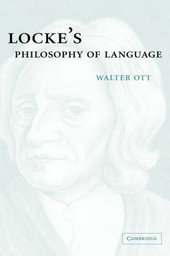
|
Locke's Philosophy of Language
Paperback / softback
Main Details
| Title |
Locke's Philosophy of Language
|
| Authors and Contributors |
By (author) Walter R. Ott
|
| Physical Properties |
| Format:Paperback / softback | | Pages:168 | | Dimensions(mm): Height 228,Width 150 |
|
| Category/Genre | Philosophy of language
Analytical philosophy and Logical Positivism |
|---|
| ISBN/Barcode |
9780521036016
|
| Classifications | Dewey:121.68092 |
|---|
| Audience | | Professional & Vocational | |
|---|
| Illustrations |
Worked examples or Exercises
|
|
Publishing Details |
| Publisher |
Cambridge University Press
|
| Imprint |
Cambridge University Press
|
| Publication Date |
26 March 2007 |
| Publication Country |
United Kingdom
|
Description
This book examines John Locke's claims about the nature and workings of language. Walter Ott proposes an interpretation of Locke's thesis in which words signify ideas in the mind of the speaker, and argues that rather than employing such notions as sense or reference, Locke relies on an ancient tradition that understands signification as reliable indication. He then uses this interpretation to explain crucial areas of Locke's metaphysics and epistemology, including essence, abstraction, knowledge and mental representation. His discussion challenges many of the orthodox readings of Locke, and will be of interest to historians of philosophy and philosophers of language alike.
Author Biography
Walter R. Ott is Assistant Professor of Philosophy at East Tennessee State University. He has published in a number of journals including Ancient Philosophy, Dialogue, Locke Studies/Locke Newsletter, and the Journal of Philosophical Research.
Reviews'Walter Ott's is a very welcome book ... exclusively devoted to this important topic ... Ott offers some genuinely fascinating insights into Locke ...' Annual Journal of Locke Research '... this promising first book devoted to Locke's philosophy of language opens with a ... stimulating interpretation of Locke's views on signification, particles and propositions. General readers will also enjoy the broad scope of the remainder of Ott's book ...' British Journal for the History of Philosophy
|